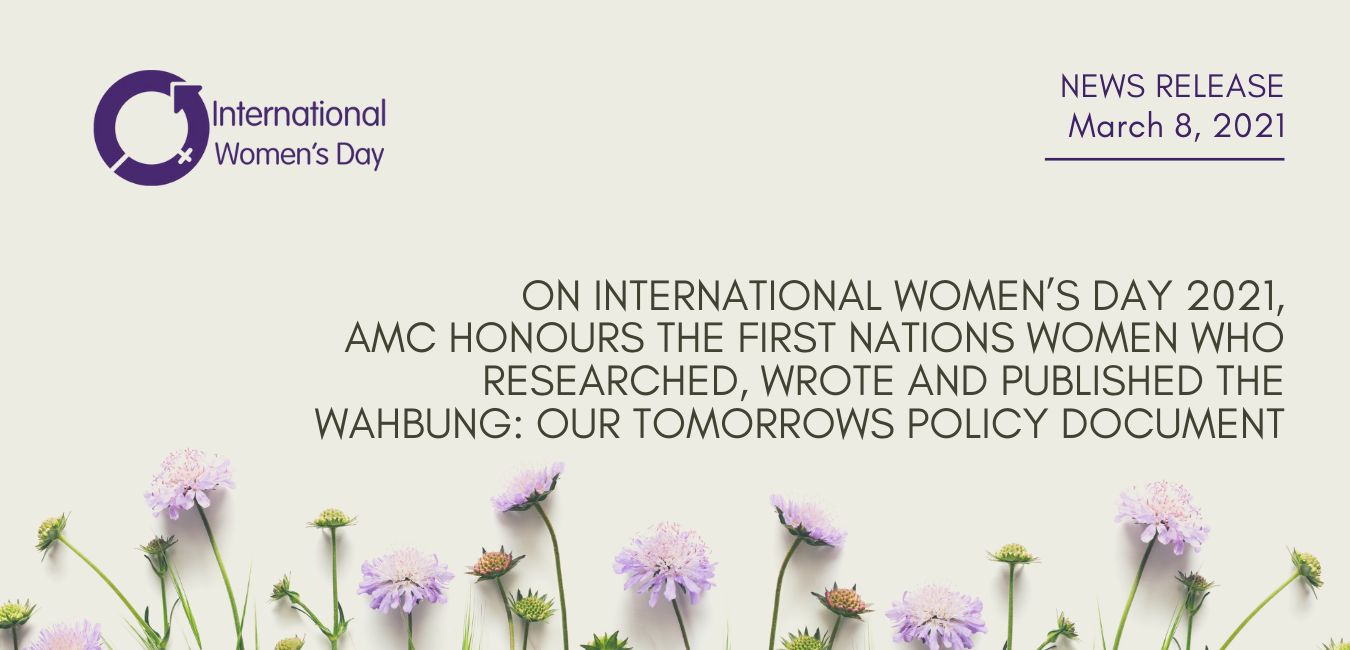On International Women’s Day 2021, AMC honours the First Nations women who researched, wrote and published the Wahbung: Our Tomorrows policy document

March 8, 2021
Treaty One Territory, Manitoba
alexpapineau
Treaty One Territory, Manitoba – In recognition of International Women’s Day 2021, and in commemoration of the 50th anniversary of the publication of Wahbung: Our Tomorrows, the Assembly of Manitoba Chiefs (AMC) honours and recognizes the women who researched, wrote and published the Wahbung policy paper.
In 1971 Wahbung was presented by Grand Chief Dave Courchene Sr. and Chief Jean Folster of the Norway House Cree Nation, one of the first Women Chiefs in Canada, to the Minister of Indian Affairs, the Honourable Jean Chrétien, in Rivers, Manitoba. All of the background work, research, and writing for Wahbung were led by First Nations women at the time. It is not possible to name all of the women who contributed to Wahbung; however, the following women are featured in the documentary, Our Tomorrows, Today: Wahbung 1971. (Click here to View)
Women responsible for the publication of Wahbung, include:
- Verna J. Kirkness – Education Writer and Researcher
- Jocelyn Wilson (Bruyere) – Director of Consultations and Negotiations
- Janet Spence – Fontaine – Health Writer and Researcher
- Elizabeth Bird – Field Work Leader, North
- Lillian Edwards – Field Worker, South
- Barbara Ross – Field Worker, North
“On International Women’s Day 2021, on behalf of the Assembly, I thank and lift up all First Nations women for holding up their part of the sky, in particularly the great women who were responsible for leading the research and writing for each of the policy sectors referenced in Wahbung: Our Tomorrows,” said Grand Chief Arlen Dumas.
“These fierce trailblazers accomplished remarkable feats under challenging conditions, during a time when women’s rights were just coming into their own and during a time when First Nations’ rights were under an unprecedented attack through government policies such as the ‘White Paper,” added Grand Chief Dumas. Their beautiful and eloquent research and writing for all the sectors referenced in our seminal policy document was a powerful rebuttal to the ‘White Paper.’ Their work resonates to this day and continues to drive the work of today’s Chiefs and their advocacy organization, now known as the Assembly of Manitoba Chiefs. The Assembly will continue to be guided by their work for the next 50 years, to ensure that our rights and the special relationship between the First Nations in Manitoba and the successor State continues to be respected and strengthened based on First Nations’ positions researched and articulated by First Nations Women,” concluded Grand Chief Dumas.
The work of the women in Wahbung was acknowledged by Chrétien at the time as very well-researched, and he stated that Wahbung was the best of the position papers published by the regional First Nations advocacy organizations at the time. However, the First Nations leadership at the time never received a formal response from government to Wahbung. The women featured in the documentary continue to express their disappointment to this day at the lack of respect from the federal government for First Nations’ positions.